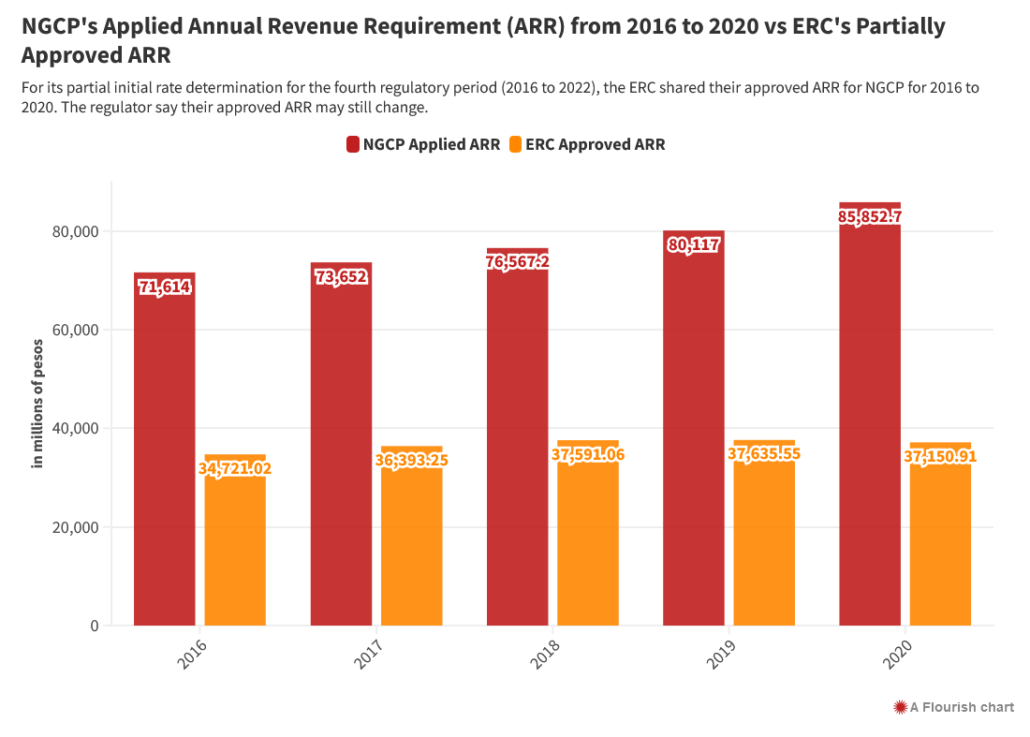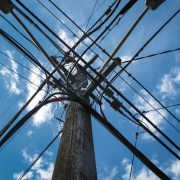Philippine power transmission monopoly NGCP questions rate review amid calls for refund
Delays in the rate review process mean the National Grid Corporation of the Philippines will continue to charge transmission rates that critics have described as ‘excessive.’
BY ELYSSA LOPEZ / Philippine Center for Investigative Journalism
First of two parts
The Supreme Court petition filed by the National Grid Corporation of the Philippines (NGCP) to halt a long-delayed review of its rates could keep power costs high and delay potential refunds to consumers.
NGCP is a private monopoly that operates the country’s power transmission lines — the grid — linking power generators to distribution utilities such as Meralco and electric cooperatives nationwide. Costs incurred by the NGCP are passed on to consumers as part of their electric bills, accounting for about 10% of the total bill based on estimates.
The NGCP suffered a setback in November last year when the Energy Regulatory Commission (ERC), in a preliminary review of its rates from 2016 to 2022, the fourth regulatory period (RP), cut its allowable expenditures by half.
The amount included disallowances worth P3.7 billion, which were spent for public relations and advertising costs, among others, that ERC said should not be charged to consumers.
Senators have been among the most vocal in calling for the ERC to order refunds to consumers.
But the NGCP questioned before the Supreme Court new rules adopted by the ERC when it reviewed the rates of the transmission operator. It sought a temporary restraining order (TRO) on the ERC proceedings.
NGCP lawyer Jerome Versoza announced this move in December 2023, as the ERC began proceedings for the fifth RP covering the years 2023 to 2027.
A TRO, if granted, would restrain “the honorable commission from continuing further proceedings with concern to the fourth RP application and the fifth RP application,” the NGCP lawyer said.
The fourth RP, covering the years 2016 to 2022, is the subject of the November preliminary review, whose final determination is expected in the first quarter of 2024. The fifth RP covers the current period, from 2023 to 2027.
‘There is still no TRO’
Pete Ilagan, a consumer affairs advocate and former energy official, warned that a Supreme Court intervention would “delay the reset process, definitely.”
“But the bigger issue is the application for the fourth regulatory process is still pending, and it’s already past the period,” he said. “[It is] a clear case of regulatory failure.”
During the December 2023 hearing, ERC presiding officer, Maria Corazon Gines, took note of Versoza’s manifestation, but proceeded with the pre-trial for the fifth review as the Supreme Court had yet to act on the NGCP’s plea.
“As there is still no TRO or preliminary injunction, then we will continue with the proceedings,” she said.
NGCP’s counsels stayed in the room but did not comment during the two-hour proceedings.
The details of the NGCP petition remain under wraps. News organizations including the Philippine Center for Investigative Journalism (PCIJ) have repeatedly sought a copy from NGCP, but were denied.
The PCIJ has also requested a copy from the ERC, but was refused. The regulator argued that the PCIJ was “not a party to the said case.”
“The ERC is enjoined to observe the sub judice rule (which restricts comments and disclosures pertaining to judicial proceedings), consequently, [we are] constrained to deny your FOI (freedom of information) request,” it wrote in a letter to the PCIJ.
NGCP has publicly questioned ERC’s preliminary review of its rates because the ERC — hobbled by internal issues and later on, the Covid-19 pandemic — changed the rules governing the review process.
READ: NGCP’s rate reset: A timeline
The ERC review, called the “rate reset,” is normally forward-looking and akin to a budget process. The ERC approves NGCP’s annual revenue requirement or ARR from which it can charge its expenditures.
The original timeframe of the fourth regulatory period covered five years – from 2016 to 2020. The rate reset should have been done in 2015. However, a series of leadership changes in the ERC delayed the process.
ERC only started the review process in December 2022. ERC decided to look at NGCP’s actual expenses and added two more years to the fourth review period – 2016-2022 from the original 2016-2020 – to clear the backlog in time for the fifth review covering 2023 to 2027.
READ: What is the rate reset process?
Critics have found NGCP’s transmission rates, set in 2009, to be “excessive.”
The ERC’s preliminary review of NGCP’s rates from 2016 to 2022 cut NGCP’s revenue requirement, essentially, the transmission operator’s allowable expenses, to more than half.
In its application, NGCP sought a revenue requirement worth P387.80 billion for 2016 to 2020, which meant an annual average of P129 billion. But the ERC, based on its initial review, found that allowable revenue should only be at P183 billion for the period, or about P36.67 billion a year.

The NGCP, from 2016 to 2020, operated on an interim maximum annual revenue (iMAR), approved by the ERC under a different leadership.
This iMAR, said NGCP Assistant Vice President Cynthia Alabanza, was only an estimate but was approved by the ERC as there was no regulatory review at that time.
“Just like when Congress hasn’t approved a government budget, the government would spend based on what was previously allowed. So that’s what we were doing… we were spending based on what was allowed [in the third regulatory period],” Alabanza said in Filipino in a news conference in November 2023.
But the iMAR could be subject to review and may be revised, based on ERC rules.
Majority of the ERC’s cuts in the preliminary review came from three major items:
• net efficiency adjustment
• revenue under-recoveries
• net performance incentive
These three items were worth P104 billion during the five-year review period.
The net efficiency adjustment is the incentive given to the NGCP for achieving “cost reductions in controllable costs,” while revenue under-recoveries are expense items not recovered during the previous regulatory period.
ERC said a decision on both items would be made in the final determination of the review due this quarter.
It is not, however, keen on granting a net performance incentive to the transmission operator.
This incentive is based on a performance incentive scheme (PIS), a set of service and operational performance criteria, which is supposedly set before the beginning of every regulatory period.
If the NGCP meets these criteria, it is rewarded with an incentive. Otherwise, penalties may be imposed.
In its application for the fourth rate reset, the NGCP adopted the PIS set during the third regulatory period. But the ERC said it was “constrained from upholding this position.”
“Considering that the PIS and its factors have not been established prior to the commencement of the fourth regulatory period, it follows that NGCP does not have the basis to enforce the incentives. Conversely, there appears to be no grounds for the imposition of penalties,” the November ERC order read.
Former ERC commissioner Alfredo Non said the ERC position was debatable because the NGCP should be recognized for meeting the criteria for incentives in the previous regulatory period.
“It is not NGCP’s fault that ERC failed to provide parameters for the fourth regulatory period,” said Non, who was ERC commissioner from 2012 to 2018.
ERC said the disallowances were intended to protect consumers. (CONTINUED)







